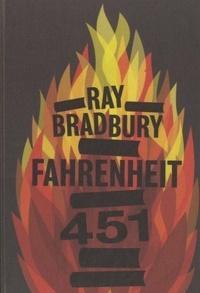vin_aigre reviewed Fahrenheit 451 by Ray Bradbury
None
1 star
Somehow, I imagined the first book I’d end up reviewing here would leave me in an unfathomable state of trance. I was never more accurate.
Before throwing myself in the firestorm of Fahrenheit 451, I thought I’d check the back covering of my edition. I’m not sure whether it figures in your edition but mine states: “The classic novel of a post-literate future, Fahrenheit 451 stands alongside Orwell’s 1984 and Huxley’s Brave New World…”
Being the type of person who tackles books with no expectations whatsoever, reading those lines irretrievably mutated my expectations from the default neutron state to the proton state.
After closing the book, guess how close it came to 1984. You see that little “o” in 1984? No not the one in nine. The smaller, more damaged one, in number eight. That’s how tangible it is to Orwell’s novel.
Bradbury’s supposedly dystopian world lacks pillars.
It’s simply not convincing. He wasn’t even trying to make it authentic.
Maybe he wanted to focus on the characters and shed some light on their motions and thoughts, right? Nein. The characters are mostly blank and see-through. The few characters that actually might have something to say suffer from existence disorders: you don’t understand how they pop in the course of events and you have no clue how or when they depart.
Mostly, I couldn’t follow Bradbury’s narrative lens, either because of its abrupt shifting or the time it consumed capturing all the possible metaphors one can think of in a beginner English writing class. Seriously, the book was a challenge to how many metaphors one can squeeze in a single literary work. And just when you’re about to overcome their abundance, you’ll surrender to their confusing cores and/or dull structures. Think I’m exaggerating? Try this sentence: “He felt as if he had left a stage behind and many actors.” Or this one: “There was a smell like a cut potato from all the land, raw and cold and white from having the moon on it most of the night.” That’s right. Moon-colored potatoes. Or even this one: “The boulevard was as clean as the surface of an arena two minutes before the appearance of certain un-named victims and certain unknown killers.” Tide commercial writers do better than this.
And here’s my favorite: “…out of the sky, fluttering, came the helicopter like a grotesque flower.” Because when you’re describing a critical chase in your dystopian community, be sure to compare your tracking- killing machine to a grotesque flower.
So after the engaging title and the scientific fact behind it, I began losing interest in the story, from its first couple pages. I felt quite betrayed to be honest. Ironically, I’m considering testing the temperature paper-burning fact on this particular book. Maybe I’ll even use the fire to bake some… moon-colored potatoes?

